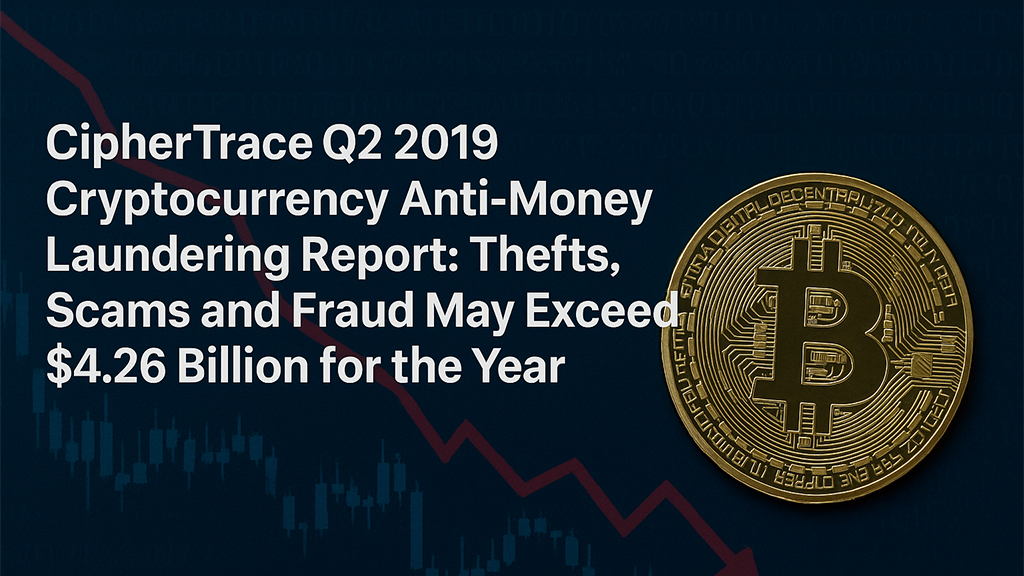
Regulators Rock the Crypto World by Threatening an End to Anonymity with “Travel Rule”
Snapshot of the key trends:
- G20 countries begin implementing new FATF Travel Rule – A ticking clock for criminals who need to launder illicit funds, and a looming shock to the global crypto economy
- Second massive, multi-billion exit scam in 12 months, while exchange thefts increased in sophistication
- Facebook awakened regulators globally to the reality and risks of virtual assets with the announcement of its own “global cryptocurrency” — Libra
- Rogue regimes continue efforts to use cryptocurrencies, Bitcoin mining, and exchange thefts to evade sanctions
August 13, 2019 – Menlo Park. CipherTrace, a leading cryptocurrency intelligence firm, today released its Q2 2019 Cryptocurrency Anti-Money Laundering (AML) Report. Widely referenced globally, this quarterly report analyzes cryptocurrency-related crime and how countries are working to foster trust and safety in the crypto economy. This second report of 2019 provides a comprehensive overview of major cryptocurrency thefts, scams and fraud worldwide, active and pending regulatory legislation, and emerging trends. CipherTrace also covers Facebook’s Libra and its potential implications for global finance.
Thefts from Exchanges Continue Despite Increased Security
Although exchanges, wallets and other cryptocurrency custody services are strengthening their defenses, hackers continue to innovate and outpace even the current state of the cyber security art. Even Binance, the world’s number-one cryptocurrency exchange, lost tens of millions of crypto assets to a cyberattack perpetrated by sophisticated hackers using a lethal cocktail of phishing, viruses and other attack vectors. In total, cybercriminals looted $125 million in Bitcoin, Ethereum and other digital assets from exchanges this quarter. However, CipherTrace based this theft number on the price of the assets at the time they were stolen. In actuality, given the recent price movement of Bitcoin and other tokens, this value is likely much greater since they more than doubled in value during Q2 2019. Additional exit scams, thefts and dark market takedowns still under investigation could push the total losses much higher.
2019 Shaping Up as the Year of the Exit Scam
Additionally, this quarter’s report identifies a concerning trend that may once again overshadow the cryptocurrency losses due to cyberattacks—the “Exit Scam.” While thefts due to cyberattacks have netted criminals US$287 million during the first half of 2019, several alleged exit scams under investigation have resulted in fraudsters making away with more than $3.1 billion dollars while $851 million was reportedly ‘lost’ by Bitfinex. In aggregate, hacks, exit scams and misappropriation of funds fraud, cost cryptocurrency exchanges, investors and users US$4.26 billion in the first half.
Global Regulatory Imperative as FATF Travel Rule Now Applies to Cryptocurrency
Owing to the acceleration of hacks and frauds in tandem with related money laundering—as well as high-profile abuses of cryptocurrency by rogue countries to evade sanctions—regulatory bodies have increased their oversight of virtual assets. For a major example, the Financial Action Task Force (FATF) rocked the crypto economy with a new “travel rule”—for which the G20 announced its full support in Osaka in June—that requires transactions between exchanges to include personal information about the sender and the receiver of funds similar to international bank wire and SWIFT transfers of fiat funds.
Facebook Awakens Policy Makers with Announcement of Libra
Cryptocurrency regulation is now obviously viewed as an imperative across the globe, and there is increasing political concern about the potential financial disruption blockchain technologies pose. In particular, Facebook’s entre into the cryptocurrency world by announcing Libra ignited a fury of debate in global capitals regarding the risks and rewards of these new financial tools.
2019 Shaping Up as the Year of the Exit Scam While Dark Markets Fall Like Dominoes
This report also covers a revealing new update from Canadian courts regarding the implosion of QuadrigaCX in Q1—what had been Canada’s largest exchange. The “Fifth Report of the Monitor” confirms CipherTrace’s assertions of fraud and misappropriation of funds over years, which ultimately cost exchange users nearly US$200 million in lost crypto assets.
At the end of Q2, a bizarre saga unfolded involving an unconfirmed exit scam around PlusToken, a purportedly South Korean exchange and investment pyramid scheme. It culminated at the end of June with Chinese police arresting six Chinese nationals, the “PlusToken 6,” on the South Pacific island of Vanuatu, and may have cost millions of unsuspecting crypto investors as much as US$2.9 billion in lost funds. CipherTrace has not completely confirmed the details of this alleged exit scam, including in whose pockets the billions ultimately found a home.
Meanwhile, the darknet marketplace Wall Street Market’s attempted an $11 million exit scam that was thwarted Europol. Wall Street Market was one of three darknet markets seized this quarter. Also, new research by CipherTrace reveals that despite the proliferation of privacy coins, Bitcoin is still king in dark markets and cybercrime.
For access to the full report, visit: https://ciphertrace.com/articles/q2-2019-cryptocurrency-anti-money-laundering-report/
About CipherTrace
CipherTrace anti-money laundering, blockchain forensics, and crypto ThreatIntel™ solutions are powered by advanced cryptocurrency intelligence. Financial investigators and regulators use CipherTrace blockchain analytics to trace transactions and monitor compliance. Leading exchanges, funds, banks and digital asset business use CipherTrace to comply with regulation and mitigate virtual asset risk exposure.
CipherTrace was founded in 2015 by experienced Silicon Valley entrepreneurs with deep expertise in cybersecurity, eCrime, payments, banking, encryption, and virtual currencies. The U.S. Department of Homeland Security (DHS) Science and Technology (S&T) and DARPA initially funded CipherTrace, and it is backed by leading New York and Silicon Valley venture capital investors.
